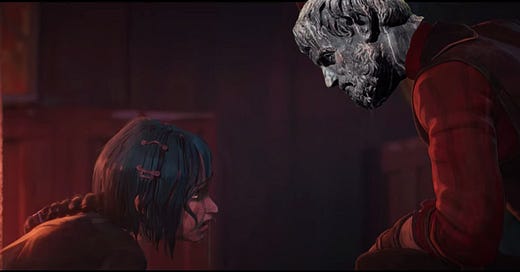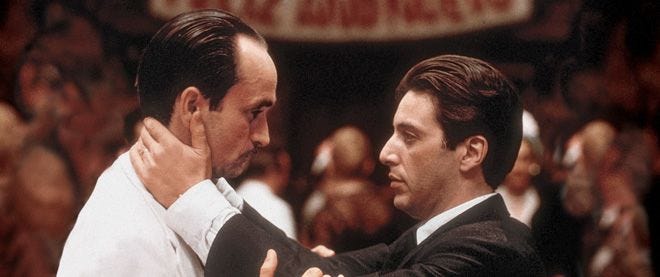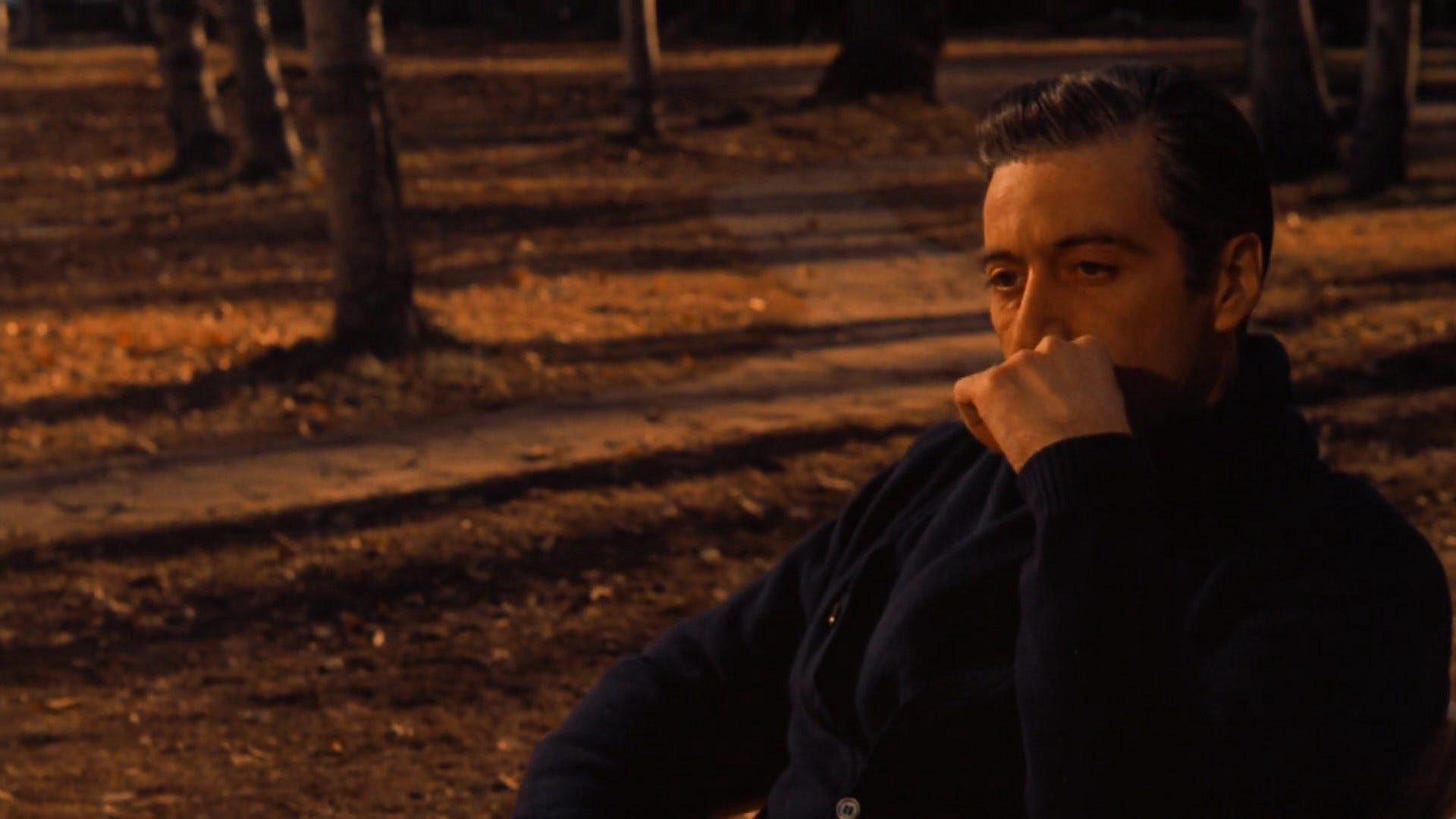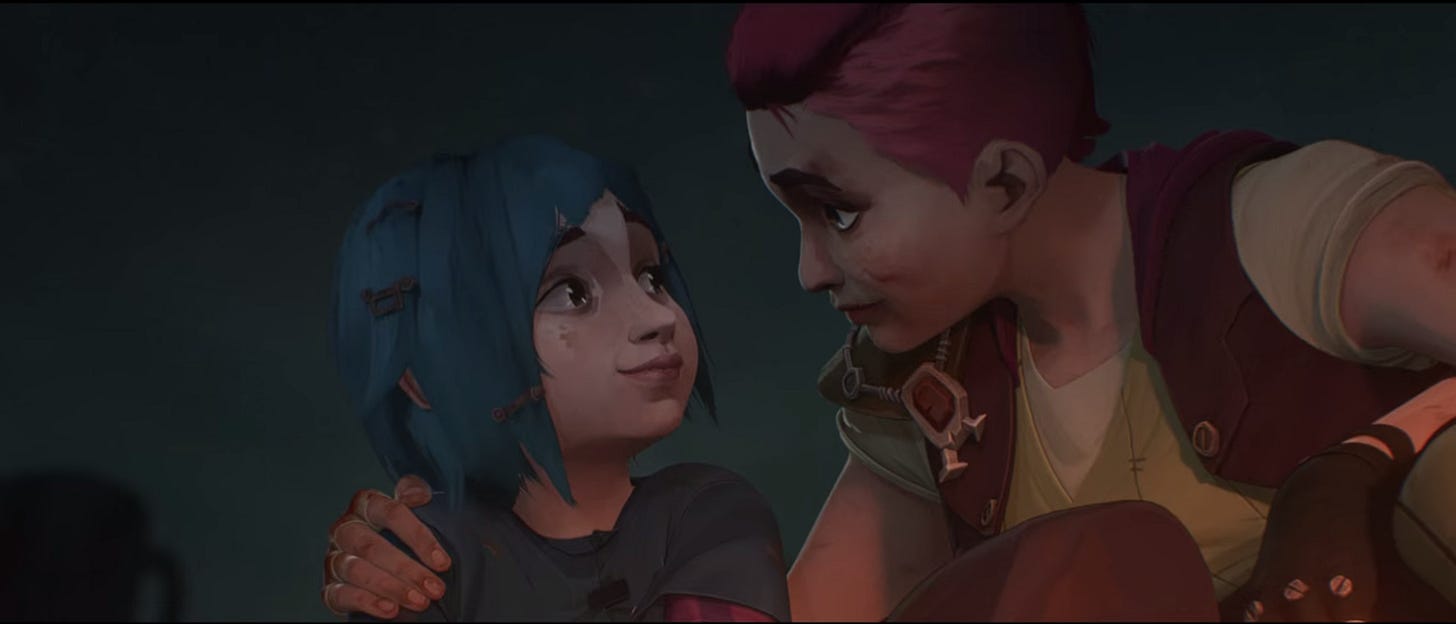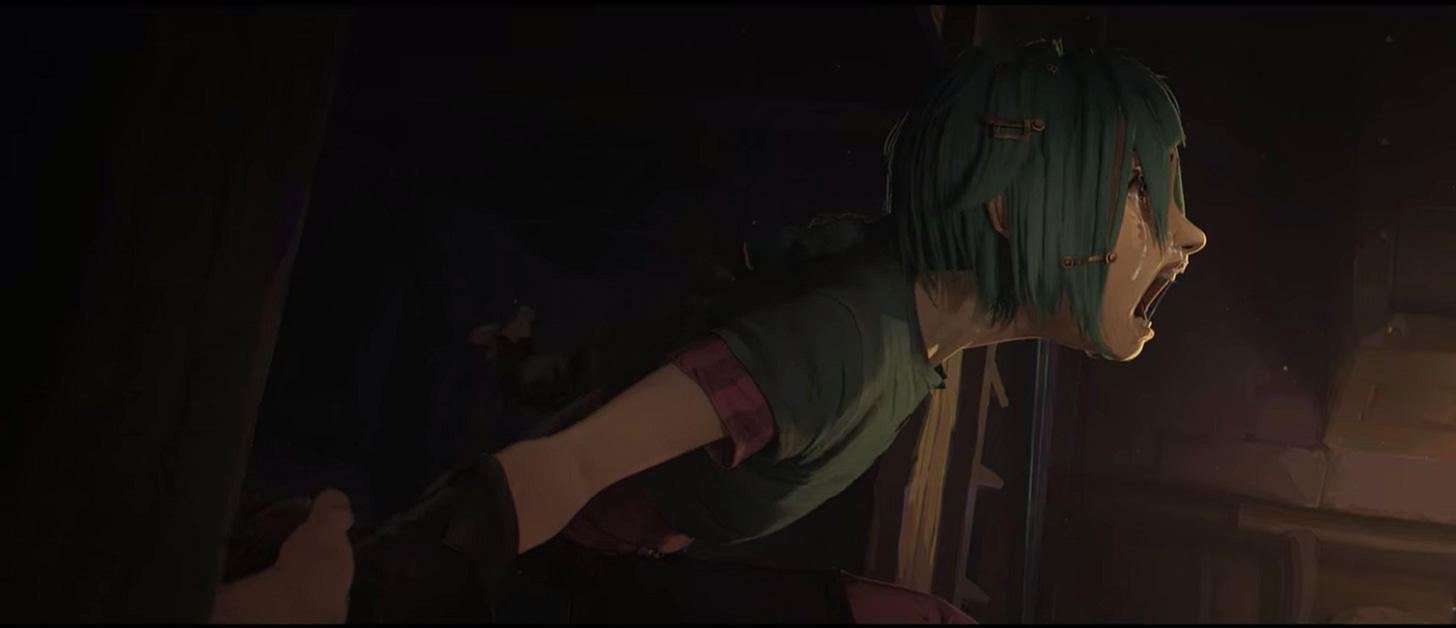SPOILER WARNING: This section will be filled with spoilers from the first three episodes of Arcane, as well as a few spoilers for the Godfather II and Hamlet. If you are unfamiliar with the Godfather or Hamlet, they aren’t necessary to understanding this deep dive, but two of my top recommended tragedies.
AUTHOR NOTE: The thoughts below are based purely on my own observations of the television show “Arcane: League of Legends” and the direct text of Aristotle’s “Poetics” based on the S.H. Butcher translation originally published in 1895. For this deep dive, I was too lazy to place footnotes on every quote, but any time you see quotations, know that the source is Aristotle’s words as translated by Butcher.
Introduction
If you have not read Part I of this deep dive, I recommend going through it first. In this section I will often make reference to terms used in Aristotle’s Poetics by placing them in quotes. (Example: ‘thought’) These words sometimes have a special meaning that carries more complexity than the standard dictionary definition, so I explain their meanings to the best of my ability in that first section.
Part IV: The Four Types of Tragic Incidents
(Still with me? Then you’re in luck because now we’re going to get into some juicy writing bits!)
Ranking Tragic Incidents from Best to Worst
At the end of Episode 3, we come to a climactic rescue scene that brings together several character arcs into one of Arcane’s most emotionally tragic scenes. The tension building in each one of these arcs is finally broken in a series of ‘tragic incidents’ fired at us in rapid succession and conclude on one pivotal, soul crushing moment in Powder's arc.
The question is: why is this scene so emotionally riveting? How does it work so well compared to other tragic moments in other shows that seem to not hit as hard as this video-game-based cartoon?
Well, according to Aristotle, the success of this scene is no accident. As a matter of fact, he has a way of measuring just how successfully cathartic a plot will be by categorizing tragic incidents and ranking them from best to worst.
SPOILER ALERT IF YOU NEVER READ ‘HAMLET’ IN THE LAST 400 YEARS
A ‘tragic incident’ might be the tragic incident that is the climax of a story. (i.e. Hamlet dies by Laertes poison blade after finally killing his uncle for murdering his father.) However, there might also be several tragic incidents both major and minor throughout the story. (i.e. Polonius is stabbed accidentally by Hamlet thinking it is his uncle which causes Ophelia to go mad and take her own life which causes Laertes to want Hamlet dead, etc. etc.)
Aristotle describes these tragic incidents as falling into a series of quadrants that he ranks from best to worst:
An act about to be done in ignorance, discovery before the act (best)
(Hamlet about to drink from the poison goblet, but his mother drinks from it first)
An act done in ignorance, discovery after
(Hamlet’s mother drinking from the poison goblet meant to kill Hamlet)
An act done with knowledge
(Laertes cuts Hamlet with his poison blade)
An act about to be done with knowledge, not done (worst)
(Hamlet almost stabs his uncle while he is praying, but holds off for a better moment for his revenge)
SPOILER ALERT: If you haven’t seen the Godfather II, I am about to ruin the end of the movie for you in this next example. And it’s a great movie, so if you haven’t watched it, I recommend pausing your life for the necessary 6+ hours you need to watch the Godfather and Godfather II. (I’ve marked where the spoilers end if you want to scroll ahead.)
Moving on, one way you might think about these types of incidents is thinking about the ending of Godfather II: Michael has his own brother, Fredo, shot in a fishing boat for betraying the family and helping a rival crime lord in a failed attempt to have Michael murdered.
If that incident were played out as the #4 (worst) type, Michael would plan to have Fredo shot in the boat by his henchman, but before it happens, he decides it is not a good idea and forgives him instead. Fredo lives, no real tragedy, and credits roll. Pretty weak.
If the incident is done with knowledge (as it is in the movie), Michael sends his man out in the boat knowing he is going to kill his brother for his betrayal—despite his apparent forgiveness of Fredo earlier. Fredo dies. Michael watches it happen from the shore--cementing the irony of him destroying the family he blames Fredo for betraying. The end.
Aristotle would argue with Francis Ford Coppola that a stronger incident might be option #2: done in ignorance and discovery after. In this example, Michael might learn that the person who betrayed him to the rival crime family is going to be out fishing in a boat. Not knowing the identity of this person, he might send out his hit man only to discover afterward he just killed his brother, Fredo. (Classic Greek tragedy.)
Finally, Aristotle may drive the stake deeper into Coppola’s heart by saying, “Heck, Frank, what would be even better would be if Michael doesn’t know he’s about to have his brother shot and right before his guy pulls the trigger, Michael recognizes it is Fredo! So aghast with shock and guilt, he yells to his hit guy, “Wait! Stop! That’s Fredo!” They row back to shore. Michael realizes blood is thicker than water. Maybe the chorus sings something about guilt or whatever. So much better, though, right?”
(END GODFATHER SPOILERS)
Obviously, there’s a lot more to the Godfather script that would make any one of these examples ridiculous, but this is just an exercise in understanding how each tragic incident works.
As always, there can be many shades of gray with these terms. My point with this example is to explain the reasoning of how a plot incident chosen by the writers might rank higher or lower on this scale. So let’s get back to Arcane and Powder’s character arc.
Building Powder’s Arc Using Tragic Incidents
Up until the final moments of act one, the writers have been steadily building Powder’s arc putting her character up against multiple challenges with plot. These challenges reveal choices and feelings that make up the ‘quality’ of her character and set us up for how ‘the law of probability and necessity’ will play out for her at the end of the act.
Let’s review some of those key moments for Powder’s character using Aristotle’s elements of Tragedy to describe them:
Reversal of Situation (good fortune to bad): Powder drops the Arcane stones, setting off the explosion and getting the group chased by police.
Reversal of Situation (good fortune to bad): Powder tosses the loot wasting all the kids’ efforts after winning the fight.
Recognition: Powder overhears Milo talking to Vi about how Powder is a jinx and always screws things up when she goes with them.
Simple plot point (characters’ fortunes do not get better or worse): While hiding from the police, Powder nearly blows their cover and falls when her strength gives out. The crisis is averted.
Recognition & Reversal (good to bad): Vi reveals to Powder that she does not believe Powder should help with Vander’s rescue--despite all the things Vi said to build Powder’s confidence. Powder’s position reverses from feeling capable of helping to being incapable and a liability.
Scene of Suffering: Powder has a tantrum alone in her room showing her emotional distress over feeling useless as part of the group.
Recognition & Reversal (bad to good): Powder sees the Arcane crystals make a spark and makes the connection between the stones and the explosion at the beginning. Powder goes from a position of weakness to a position of power by having the stones.
This last ‘reversal of situation’ for Powder leads us into the final rescue scene. The important thing to note here is that this character arc has been carefully built up by revealing and challenging Powder’s character with plot. (Remember: reversals and recognitions are plot, not character.) Also note that not all of these moments represent actions that change the fortune of the characters, but all of the moments are still creating plot.
Having picked out some key plot points in Powder’s arc, we can begin to rank each one of them with Aristotle’s scale to see how strong or weak they are leading up to the climactic catharsis we feel for Powder at the end. I’ll rank them from 1 (best type) to 4 (worst type):
2 - Reversal: Powder drops the Arcane stones, setting off the explosion and getting the group chased by police.
Done in ignorance, recognizes the results after
First action showing evidence of Powder being a detriment to the group’s efforts
3 - Reversal: Powder tosses the loot wasting all the kids’ efforts
Done with knowledge of what’s at stake, follows through anyway
Second action showing evidence of Powder being a detriment to the group
N/A - Recognition: Powder overhears Milo talking to Vi about how Powder is a jinx and always screws things up when she goes on jobs with them.
This is ‘thought’ not action. While it reveals information that reinforces Powder’s insecurity, it does not demonstrate through action what her character chooses or avoids.
4 - Simple plot point: While hiding from the police, Powder nearly blows their cover and falls when her strength gives out. The crisis is averted.
About to be done with knowledge that if she falls she will blow their cover, but she does not fall while the officer is still in the room. It is interesting to note that tension is created here that does not pay off in tragedy, but it does create feelings of pity and fear for Powder.
Third action evidence that Powder almost put the group in danger.
1 - Recognition & Reversal: Vi reveals to Powder that she does not believe Powder should help with Vander’s rescue--despite all the things Vi said to build her confidence. Powder’s position reverses from feeling capable of helping to being incapable and a liability.
This one is tricky. It is a complex plot event with a ‘recognition’ moment from Vi’s information and an internal ‘reversal’ when Powder realizes she’s not as capable as she believed. Powder is faced with both information reinforcing her insecurity and feelings of betrayal by her most trusted defender, Vi.
The only action here might be Powder’s choice to obey her sister, showing that she respects and probably agrees with her. Therefore, it does show evidence of what she chooses or avoids.
Can it be categorized as a tragic incident? Well, returning to Aristotle’s definition of tragedy, does it create fear or pity? Yes! Of course we pity Powder in this moment of truth even if we don’t hate Vi because we see her motivations are to protect Powder.
So in this heart wrenching moment for their relationship, I am actually categorizing this incident as the confusing and elusive #1: Powder is about to go with the group in ignorance of her capabilities and then she does not go when the truth of her standing in Vi’s opinion is revealed to her.
N/A - Scene of Suffering: Powder has a tantrum alone in her room showing her emotional distress over feeling useless as part of the group.
The scene of suffering affects the audience by creating pity for the character, but this would probably not be considered a tragic incident since no choices are made that reveal the character’s morality.
2 - Recognition & Reversal: Powder sees the Arcane crystals make a spark and makes the connection between the stones and the explosion at the beginning. Powder goes from a position of weakness to a position of power by having the stones.
This is another tricky one. Tragic results come from her choice to use the stones, but those occur in a later scene. Here the action is Powder accidentally dropping the stones leading to her recognition discovery and choice to leave the house against Vi’s direction.
Powder’s choice morally reveals her intentions are good, wanting to help the group, but her need to prove she is not a liability after multiple recent failures undermines her better judgment to follow her sister’s directions.
Since the action of dropping the stones is done in ignorance of their power, the discovery of what they can do is after that action. So I am ranking this as a #2 incident.
This is all just my interpretation, and you may have your own opinions on how these incidents should or should not be ranked. Regardless of such nuances, what does this information tell us? Why is all this important?
Notice the variety of tragic incidents that occur in our main character’s arc. Even though Aristotle claims some incidents’ tragic effect ranks higher than others, that does not mean it is necessarily a good idea to make every action a #1 tragic incident.
Imagine for a moment that the writers made all their tragic incidents #4’s: Powder almost screws things up for the group with a choice but then doesn’t follow through with action. Even if we understand why she could potentially be a liability, always being about to act and then choosing not to would quickly become dull and predictable. Similarly, if all Powder’s actions were done in ignorance, discovering only after that she had made a tragic mistake, we would probably feel less pity and more annoyance for her character for not learning from her mistakes. Or if all the information we learn about Powder being a jinx is only revealed through ‘thought’ moments and not action moments, would we as an audience be fully convinced of the group’s disdain for Powder?
By using multiple types of incidents, the writers create a textured plot line that more accurately ‘imitates’ real life by creating a more believable variety of situations. These tragic incidents create ‘actions’ that are the logic behind Powder’s decisions and the moments of ‘thought’ and ‘suffering’ help create the pity and fear the audience needs to feel authentic concern for her when tragedy strikes.
So rather than using this ranking system as a way to use the most powerful type of tragic incident every time, a more skilled writer might recognize an important plot point and consider if that incident is being conveyed with Aristotle’s most emotionally tragic type. Looking at the plot points above, it is interesting that the highest ranked incident is the moment when the central relationship between Vi and Powder reaches its peak conflict in the story thus far.
I highly doubt the writers were thinking about Aristotle when they wrote this moment, but what this ranking allows us to understand is why good plot building is good. By making that revelation about Powder’s most vulnerable feelings a strong tragic recognition and reversal of fortune, the story’s most important character arc is given a heavy emotional weight that is going to pay off big in the climax of Act I.
The cumulative result of all these tragic elements building up is that it is understandable and believable that Powder’s resulting choices are both probable and necessary. When she chooses to leave the house with the Arcane stones and use them as a bomb in her grenade, all the steps in her plot line up to that moment make it nearly impossible for us to believe Powder would make any other decision within those given circumstances:
Powder has shown evidence on multiple occasions that she is a weak link and a liability.
Powder wants to prove to Vi that she is capable of helping the group.
Powder wants to prove to the group she is not a jinx.
Powder is feeling emotionally distressed about not being able to help her friends and being betrayed by her sister--both affecting her better judgment (‘error’.)
Powder sees an opportunity to turn her ‘frailty’--her grenades that don’t work--into a strength with the Arcane stones which gives her a chance to solve all of the above.
NEXT TIME:
Part V: The Two Types of Tragedy
I really thought by now I’d be done, but the deeper I dig into Poetics, this whole analysis just keeps getting longer and longer! So if you are one of the the few people who is actually reading this, you might just be excited to learn there’s four more parts! In the next newsletter, I will dive into Parts V & VI which will be mostly be another examination of Aristotle’s terms and definitions: the Two Parts of a Tragedy, the Four Types of Tragedy, and the dreaded Deus Ex Machina. If you want to write great characters and understand how well written plots can both drive and define strong character motivations, you don’t want to miss this study. Finally, in Parts VII & VIII we will apply these terms to the final Act I scene of Arcane to explain how it all comes together in a way I’m sure Aristotle would be proud.
Sterling Martin is an artist and designer living in Chicago, IL. His background includes drawing, writing, theatre, teaching, improv & sketch comedy, and whatever else he can get his hands on to be creative. You can find him on the internet at:
Instagram: @sterfest.art
Website: sterlingmartin.design
Twitter: Maybe someday?
Linkedin: I’m pretty sure I have one of those
Facebook: Ugh, do I have to?


